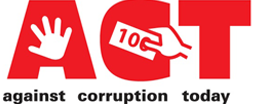Public Education

The Public Education component is mandated, in particular, by S.10(1)(a)(iii)(iv) of the Act to disseminate information on the evil and dangerous effects of corrupt practices on the society and to rally public support towards the fight against corruption in Swaziland. It is aimed at promoting better public understanding of corruption and encouraging society as a whole to take positive action against such practices.
In conformity to the provisions of the above, the Anti-Corruption Commission has an established fully functional public education section that implements the public education mandate. The Public Education section holds the belief that the involvement of society plays a pivotal role in the fight against corruption. As a result the Government, Civic Society, Church and Non Governmental Organisations are involved in the fight against corruption. This multidisciplinary approach renders the fight against corruption credible, versatile and sustainable. Proponents of the education process envisage that various factors affect the learning process, thus to enhance efficiency learners should be categorised into related groups. Teaching strategies effective within the youth cadre may bear negative fruits when applied to adults.
The Public Education component is mandated by the Act to
disseminate information on the evil and dangerous effects of corrupt practices
on the society and to rally for public support towards the fight against
corruption in Swaziland. It is aimed at promoting better public understanding
of corruption and encouraging society as a whole to take positive action
against such practices.
The public education awareness, can be undertaken in the form of
a) partnerships with institutions
b) a request from an institution
c) A proposal from the ACC to that institution
d) An education campaign
e) Through Trade Fairs